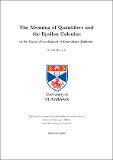Files in this item
The meaning of quantifiers and the epsilon calculus : on the logical formalization of dependence relations
Item metadata
| dc.contributor.advisor | Berto, Francesco | |
| dc.contributor.author | Bonatti, Nicola | |
| dc.coverage.spatial | 75 p. | en_US |
| dc.date.accessioned | 2021-02-22T13:10:36Z | |
| dc.date.available | 2021-02-22T13:10:36Z | |
| dc.date.issued | 2020-12-02 | |
| dc.identifier.uri | https://hdl.handle.net/10023/21474 | |
| dc.description.abstract | This work argues that the expressive and inferential powers of quantified logic are not exhausted by the classical quantifiers ∀ and ∃. Indeed, based on both the Model and Proof theoretic semantics frameworks, the work will highlight two relations of dependence as arising within formulas and inferences which are not correctly represented by the standard interpretation of ∀ and ∃. Instead, I will claim that the quantifiers ‘for all’ and ‘there exists’ should be interpreted as choice functions − according to the ε-operator of the Epsilon Calculus. Finally, I will consider as a case study the Set theory formulated in the Epsilon Calculus so as to consider how the choice functions interpretation of quantifiers affects debates concerning impredicative definitions and the logical/combinatorial view of collections. | en_US |
| dc.language.iso | en | en_US |
| dc.publisher | University of St Andrews | |
| dc.subject | Philosophy of logic | en_US |
| dc.subject | Quantifiers | en_US |
| dc.subject | Epsilon calculus | en_US |
| dc.subject.lcc | P299.Q3B7 | |
| dc.subject.lcsh | Language and logic | en |
| dc.subject.lcsh | Grammar, Comparative and general--Quantifiers | en |
| dc.title | The meaning of quantifiers and the epsilon calculus : on the logical formalization of dependence relations | en_US |
| dc.type | Thesis | en_US |
| dc.type.qualificationlevel | Doctoral | en_US |
| dc.type.qualificationname | MPhil Master of Philosophy | en_US |
| dc.publisher.institution | The University of St Andrews | en_US |
| dc.identifier.doi | https://doi.org/10.17630/sta/27 |
This item appears in the following Collection(s)
Items in the St Andrews Research Repository are protected by copyright, with all rights reserved, unless otherwise indicated.

